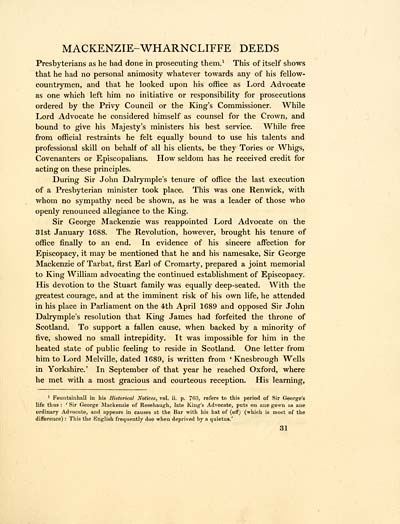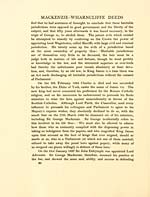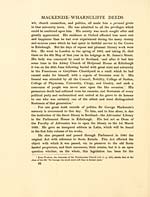Download files
Complete book:
Individual page:
Thumbnail gallery: Grid view | List view

MACKENZIE-WHARNCLIFFE DEEDS
Presbyterians as he had done in prosecuting them. 1 This of itself shows
that he had no personal animosity whatever towards any of his fellow-
countrymen, and that he looked upon his office as Lord Advocate
as one which left him no initiative or responsibility for prosecutions
ordered by the Privy Council or the King's Commissioner. While
Lord Advocate he considered himself as counsel for the Crown, and
bound to give his Majesty's ministers his best service. While free
from official restraints he felt equally bound to use his talents and
professional skill on behalf of all his clients, be they Tories or Whigs,
Covenanters or Episcopalians. How seldom has he received credit for
acting on these principles.
During Sir John Dalrymple's tenure of office the last execution
of a Presbyterian minister took place. This was one Renwick, with
whom no sympathy need be shown, as he was a leader of those who
openly renounced allegiance to the King.
Sir George Mackenzie was reappointed Lord Advocate on the
31st January 1688. The Revolution, however, brought his tenure of
office finally to an end. In evidence of his sincere affection for
Episcopacy, it may be mentioned that he and his namesake, Sir George
Mackenzie of Tarbat, first Earl of Cromarty, prepared a joint memorial
to King William advocating the continued establishment of Episcopacy.
His devotion to the Stuart family was equally deep-seated. With the
greatest courage, and at the imminent risk of his own life, he attended
in his place in Parliament on the 4th April 1689 and opposed Sir John
Dalrymple's resolution that King James had forfeited the throne of
Scotland. To support a fallen cause, when backed by a minority of
five, showed no small intrepidity. It was impossible for him in the
heated state of public feeling to reside in Scotland. One letter from
him to Lord Melville, dated 1689, is written from ' Knesbrough Wells
in Yorkshire.' In September of that year he reached Oxford, where
he met with a most gracious and courteous reception. His learning,
1 Fouutainhall in his Historical Notices, vol. ii. p. 763, refers to this period of Sir George's
life thus : ' Sir George Mackenzie of Rosehaugh, late King's Advocate, puts on ane gown as ane
ordinary Advocate, and appears in causes at the Bar with his hat of (off) (which is most of the
difference) : This the English frequently doe when deprived by a quietus.'
31
Presbyterians as he had done in prosecuting them. 1 This of itself shows
that he had no personal animosity whatever towards any of his fellow-
countrymen, and that he looked upon his office as Lord Advocate
as one which left him no initiative or responsibility for prosecutions
ordered by the Privy Council or the King's Commissioner. While
Lord Advocate he considered himself as counsel for the Crown, and
bound to give his Majesty's ministers his best service. While free
from official restraints he felt equally bound to use his talents and
professional skill on behalf of all his clients, be they Tories or Whigs,
Covenanters or Episcopalians. How seldom has he received credit for
acting on these principles.
During Sir John Dalrymple's tenure of office the last execution
of a Presbyterian minister took place. This was one Renwick, with
whom no sympathy need be shown, as he was a leader of those who
openly renounced allegiance to the King.
Sir George Mackenzie was reappointed Lord Advocate on the
31st January 1688. The Revolution, however, brought his tenure of
office finally to an end. In evidence of his sincere affection for
Episcopacy, it may be mentioned that he and his namesake, Sir George
Mackenzie of Tarbat, first Earl of Cromarty, prepared a joint memorial
to King William advocating the continued establishment of Episcopacy.
His devotion to the Stuart family was equally deep-seated. With the
greatest courage, and at the imminent risk of his own life, he attended
in his place in Parliament on the 4th April 1689 and opposed Sir John
Dalrymple's resolution that King James had forfeited the throne of
Scotland. To support a fallen cause, when backed by a minority of
five, showed no small intrepidity. It was impossible for him in the
heated state of public feeling to reside in Scotland. One letter from
him to Lord Melville, dated 1689, is written from ' Knesbrough Wells
in Yorkshire.' In September of that year he reached Oxford, where
he met with a most gracious and courteous reception. His learning,
1 Fouutainhall in his Historical Notices, vol. ii. p. 763, refers to this period of Sir George's
life thus : ' Sir George Mackenzie of Rosehaugh, late King's Advocate, puts on ane gown as ane
ordinary Advocate, and appears in causes at the Bar with his hat of (off) (which is most of the
difference) : This the English frequently doe when deprived by a quietus.'
31
Set display mode to:
![]() Universal Viewer |
Universal Viewer | ![]() Mirador |
Large image | Transcription
Mirador |
Large image | Transcription
Images and transcriptions on this page, including medium image downloads, may be used under the Creative Commons Attribution 4.0 International Licence unless otherwise stated. ![]()
| Histories of Scottish families > Ancient deeds and other writs in the Mackenzie-Wharncliffe charter-chest > (53) Page 31 |
|---|
| Permanent URL | https://digital.nls.uk/95524001 |
|---|
| Description | A selection of almost 400 printed items relating to the history of Scottish families, mostly dating from the 19th and early 20th centuries. Includes memoirs, genealogies and clan histories, with a few produced by emigrant families. The earliest family history goes back to AD 916. |
|---|

